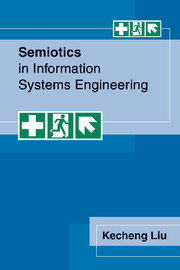Book contents
- Frontmatter
- Contents
- Preface
- 1 Introduction
- Part one Semiotic framework and methods
- Part two Applications
- 9 From semiotic analysis to systems design
- 10 Semantic temporal databases
- 11 Normbase: a new approach to information management
- 12 Case study: development of a land resources information system
- 13 Case study: development of a test construction system
- Appendix A Semantic templates and surrogate specification
- Appendix B LEGOL applications in the CRIS case
- Bibliography
- Index
12 - Case study: development of a land resources information system
Published online by Cambridge University Press: 19 September 2009
- Frontmatter
- Contents
- Preface
- 1 Introduction
- Part one Semiotic framework and methods
- Part two Applications
- 9 From semiotic analysis to systems design
- 10 Semantic temporal databases
- 11 Normbase: a new approach to information management
- 12 Case study: development of a land resources information system
- 13 Case study: development of a test construction system
- Appendix A Semantic templates and surrogate specification
- Appendix B LEGOL applications in the CRIS case
- Bibliography
- Index
Summary
In this chapter, the application of Semantic Analysis, Norm Analysis and the Normbase system in the development of a land resource information system offers an example of adopting the semiotic approach to cover activities of all stages of information systems development.
Background
The assignment was originally for students in a postgraduate GIS (geographic information systems) course at the International Institute for Aerospace Survey and Earth Science, the Netherlands. The course participants, after having worked in different disciplinary fields for many years, came from all over the world. They were supposed to use some structured method to carry out the systems analysis and design. The purpose of applying the semiotic methods was originally for a simple comparison between different approaches. However, for the purposes of this chapter, the analysis and design with the other approach will not be presented.
The objective of the case is to develop an information system for management of land resources, for an imaginary country, Snake Island. This project represents a typical type of information systems that are currently in high demand in many countries, especially the developing countries. Developing such a system requires tremendous effort, because very often such a system involves a heavy investment on expressive GIS hardware and software, and a costly multidisciplinary team of experts. On the other hand, such a system normally has a significant political, economic or other impact on the region that the system is supposed to serve.
- Type
- Chapter
- Information
- Semiotics in Information Systems Engineering , pp. 164 - 179Publisher: Cambridge University PressPrint publication year: 2000



